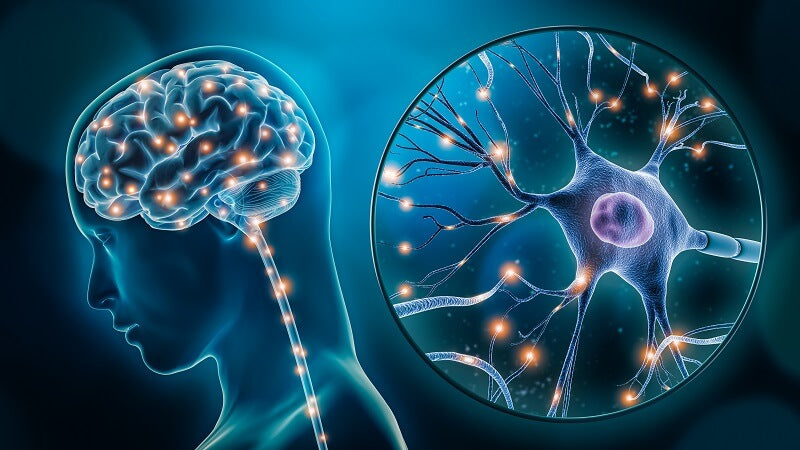Our brains are astonishing organs, but there are still secrets hidden within their complex workings. In recent years, scientists have made a remarkable discovery: the glymphatic system, a waste-clearance mechanism that plays a critical role in brain health. Unravelling the mysteries of this fascinating system has provided valuable insights into ADHD, depression, brain fog, and dementia (particularly Alzheimer's disease).
Let's embark on a journey to explore the wonders of the glymphatic system and its profound impact on brain health and dementia.
The Glymphatic System Revealed
Imagine your brain as a bustling metropolis, with cells exchanging information, processing data, and creating memories. Amidst this bustling activity, the glymphatic system silently works to clear waste and toxins from the brain. Discovered in 2012, this system operates much like the lymphatic system in the rest of the body, utilizing a network of vessels and glial cells, particularly astrocytes, to keep the brain's environment clean and optimized for peak performance.
The term glymphatic system is derived from the glial cells it relies on and its similarity to the lymphatic system. Glial cells, specifically astrocytes, act as gatekeepers, guiding the flow of cerebrospinal fluid (CSF) through the brain tissue. This fluid bathes the brain cells, removing waste products and toxins, including amyloid-beta proteins that are associated with Alzheimer's disease.
The Extraordinary Role of Sleep
One of the most intriguing aspects of the glymphatic system is its connection to sleep. While you sleep, your brain undergoes a remarkable transformation. The space between brain cells expands, and CSF flows more freely, allowing the glymphatic system to kick into high gear. As a result, waste products—including the notorious amyloid-beta proteins linked to Alzheimer's disease—are efficiently flushed away.
Studies have shown that the glymphatic system becomes significantly more active during sleep, especially during deep sleep stages. This increased activity allows for more effective clearance of waste products, helping to keep the brain healthy and functioning optimally.

The Sleep-Inflammation Connection
Inflammation, an immune system response to threats, can dramatically impact the glymphatic system. Inflammatory processes disrupt the CSF flow and the glial cells' function, hindering waste clearance. Additionally, chronic inflammation may lead to neuroinflammation, a condition where the immune system attacks brain cells, further disrupting the glymphatic system.
The consequences of this inflammatory-glymphatic relationship can create a dangerous feedback loop. Disrupted sleep, often associated with neurodegenerative diseases, can lead to more inflammation, sabotaging the glymphatic system and accelerating the disease's progression.
Dementia and the Glymphatic System
Alzheimer's disease, a devastating form of dementia, has long baffled scientists. The accumulation of amyloid-beta plaques in the brain is a defining feature of the disease. But now, thanks to the glymphatic system's discovery, a new piece of the puzzle has emerged.
Researchers have found that as we age, the glymphatic system becomes less efficient, leading to reduced clearance of amyloid-beta. Consequently, these protein accumulations begin to build up, impairing brain function and setting the stage for Alzheimer's disease.
Alzheimer's Disease: Alzheimer's disease is characterized by the accumulation of amyloid-beta plaques and tau tangles in the brain. The glymphatic system's impairment, leading to reduced clearance of amyloid-beta, has been implicated in the development and progression of Alzheimer's disease.
Other Neurodegenerative Diseases: Besides Alzheimer's, other neurodegenerative conditions, such as Parkinson's disease and multiple sclerosis, have been associated with glymphatic dysfunction. The accumulation of toxic proteins and inflammation can contribute to the progression of these diseases.
Migraine Headaches: Migraine headaches have been linked to impaired glymphatic system function, which may result in reduced waste clearance and the build-up of substances that trigger headaches.
Sleep Disorders: Sleep disorders, including insomnia, sleep apnea, and circadian rhythm disturbances, can disrupt the glymphatic system's clearance mechanisms. Poor sleep can contribute to waste accumulation in the brain, potentially exacerbating various health issues.
Cognitive Decline and Memory Disorders: Impairment of the glymphatic system's waste clearance capacity may contribute to cognitive decline and memory disorders in aging individuals.
Neuroinflammation: Dysfunctional glymphatic clearance can lead to the accumulation of inflammatory molecules in the brain, exacerbating neuroinflammation, which is associated with various neurological conditions.
Traumatic Brain Injury (TBI): TBI can lead to disruptions in the glymphatic system, impairing waste clearance and contributing to inflammation and long-term neurological consequences.
Stroke: Stroke and cerebrovascular diseases have been linked to glymphatic dysfunction, which may influence recovery and long-term outcomes.
ADHD: The glymphatic system empties into the lymphatic system at the exact point of our tonsils. There is research implicating tonsillar enlargement and ADD/ADHD. Early research also investigates the possible link between poor glymphatic clearance and ADD/ADHD.
Depression: There is a well-established link between depression and inflammation levels. Elevated inflammation levels reduce the efficiency of the glymphatic system, so it is plausible that the system is associated with depression. Research is still early; however, it is worth noting.
Top Tips to Improve the Glymphatic System
There are a few things you can do to get the glymphatic system functioning optimally. Sleep, the right diet, regular exercise, cold exposure, and natural medicines can help improve overall glymphatic system health.
Sleep
Promoting healthy sleep patterns and ensuring adequate restorative sleep are crucial steps. Adopting good sleep hygiene, creating a calming bedtime routine, and addressing sleep disorders may support the glymphatic system's function, facilitating the clearance of waste products and reducing health risks. Sleeping on your side has been shown to be the most efficient way for the glymphatic system to clear during sleep.
Check out our other article on 22 Tips to Improve Sleep.
Diet
Incorporating anti-inflammatory foods, such as omega-3-rich fish and turmeric, could also help reduce inflammation and support the glymphatic system's health. Consuming a diet rich in anti-inflammatory foods, such as fruits, vegetables, whole grains, and healthy fats (e.g., avocados, nuts, and olive oil), may help reduce brain inflammation and support glymphatic function. These foods are also high in antioxidants, which can neutralize harmful free radicals that contribute to oxidative stress and inflammation.
-
Omega-3 Fatty Acids: Omega-3 fatty acids, found in fatty fish (e.g., salmon, mackerel, and sardines), flaxseeds, chia seeds, and walnuts, have anti-inflammatory properties and may support brain health. Including sources of omega-3s in the diet may help maintain glymphatic efficiency and support waste clearance.
-
Hydration: Staying well-hydrated is essential for the proper functioning of the glymphatic system. Dehydration can impair CSF flow and waste clearance. Drinking an adequate amount of water throughout the day can help improve the efficiency of the glymphatic system.
-
Intermittent Fasting: Intermittent fasting, a dietary approach involving cycles of eating and fasting, has been shown to promote brain health and may enhance the glymphatic system's clearance of waste products. Fasting periods may trigger increased activity in the glymphatic system, facilitating waste removal.
-
Sugar and Processed Foods: Diets high in added sugars and processed foods have been associated with increased inflammation and oxidative stress in the brain. These factors can negatively impact the glymphatic system's efficiency. Reducing the intake of sugary and processed foods may help support brain health and waste clearance mechanisms.
- Curcumin (Turmeric): Curcumin, the active compound in turmeric, has potent antioxidant and anti-inflammatory properties, which may benefit brain health. Incorporating turmeric into the diet or using curcumin supplements may indirectly support the glymphatic system.

Exercise
Exercise can have a positive impact on the glymphatic system, supporting its function and waste clearance mechanisms in the brain. The glymphatic system is responsible for clearing waste products, including toxic proteins like amyloid-beta, from the brain. Here's how exercise affects the glymphatic system:
-
Increased Cerebrospinal Fluid (CSF) Flow: Exercise is associated with increased blood flow to the brain, which can also enhance CSF flow through the glymphatic system. Improved CSF flow helps to flush out waste products more efficiently and promotes better waste clearance.
-
Reduced Inflammation: Regular physical activity has anti-inflammatory effects on the body, including the brain. By reducing inflammation in the brain, exercise can help maintain the glymphatic system's efficiency and prevent disruptions that could impair waste clearance.
-
Enhanced Blood-Brain Barrier Integrity: The blood-brain barrier is a protective barrier that regulates the exchange of substances between the blood and the brain. Exercise has been shown to support the integrity of the blood-brain barrier, preventing the entry of harmful substances that could negatively affect the glymphatic system's function.
-
Improved Brain Health: Exercise has neuroprotective effects and can support overall brain health. By maintaining the health of brain cells and supporting neural connections, exercise indirectly benefits the glymphatic system's waste clearance function.
-
Improved Sleep: Regular physical activity is known to promote better sleep quality. The glymphatic system is most active during sleep, and improved sleep patterns can enhance waste clearance and brain detoxification through the glymphatic system.
- Impact on Neurotransmitters: Exercise can influence neurotransmitter levels in the brain, such as dopamine and serotonin, which are involved in mood regulation and cognitive function. These neurotransmitters may also play a role in supporting the glymphatic system's function.

Cold Exposure
Cold exposure, such as cold showers or cold-water immersion, has been found to have interesting effects on the glymphatic system. The glymphatic system is a waste-clearance system in the brain that plays a crucial role in removing metabolic waste products, including toxic proteins like amyloid-beta. Cold exposure can influence the glymphatic system through various mechanisms:
-
Enhanced Cerebrospinal Fluid (CSF) Flow: Exposure to cold temperatures has been shown to increase CSF flow through the brain, which is vital for the glymphatic system's function. The increased CSF flow may facilitate the clearance of waste products from the brain more efficiently.
-
Increased Blood Flow: Cold exposure causes vasoconstriction, a narrowing of blood vessels, in the peripheral tissues. To maintain body temperature, the body redirects blood flow from the periphery to the core. This redirection of blood may increase cerebral blood flow and promote the glymphatic system's function.
-
Neuroprotective Effects: Cold exposure has been associated with neuroprotective effects, potentially helping to maintain brain health and supporting the glymphatic system's waste clearance processes.
-
Reduced Inflammation: Cold exposure has anti-inflammatory effects, which may help to reduce neuroinflammation and promote glymphatic system efficiency. Inflammation can disrupt the glymphatic system's function, so reducing inflammation can be beneficial.
-
Hormonal Responses: Cold exposure can trigger the release of certain hormones, such as norepinephrine, which may have an impact on brain health and the glymphatic system.
- Influence on Brain Metabolism: Cold exposure may influence brain metabolism, leading to changes in waste product clearance and glymphatic system function.
Natural Medicines
Magnesium Sleep Pain
We developed MSP in response to our community needing a supplement to improve sleep, reduce pain and provide a usable source of magnesium. It just so happens that the actions of MSP perfectly align with the needs of the glymphatic system. Let’s have a look at how.
-
Anti-Inflammatory Effects: Magnesium, turmeric, and boswellia are well known to possess anti-inflammatory properties. Chronic inflammation can disrupt the glymphatic system's function, hindering the clearance of waste products from the brain. By reducing inflammation, MSP may help maintain the efficiency of the glymphatic system.
-
Neuroprotection: Magnesium plays a crucial role in maintaining brain health and supporting neural function. It is involved in various biochemical processes that contribute to nerve cell protection and maintenance. Healthy brain cells are essential for proper glymphatic system activity and waste clearance.
-
Vasodilation and Blood Flow: Magnesium and turmeric have vasodilatory effects, meaning they help widen blood vessels and improve blood flow. Improved blood flow to the brain can enhance the glymphatic system's function, facilitating the clearance of waste products from brain tissue.
-
Sleep Improvement: Magnesium, glycine and lemon balm have been linked to improved sleep quality and relaxation. As the glymphatic system is most active during sleep, better sleep patterns can support waste clearance and brain detoxification through the glymphatic system.
-
Regulation of Calcium: Magnesium plays a crucial role in balancing calcium levels in cells. Proper calcium regulation is essential for nerve cell function and communication, which may indirectly influence the glymphatic system.
- Antioxidant Effects: Magnesium and turmeric have potent antioxidant properties that can help neutralize harmful free radicals in the brain. Reducing oxidative stress may support glymphatic function and overall brain health.
Other natural medicines which show promise to support the glymphatic system:
-
Omega-3 Fatty Acids: Omega-3 fatty acids, found in fatty fish (like salmon, mackerel, and sardines), flaxseeds, chia seeds, and walnuts, have anti-inflammatory properties and may support brain health.
-
Triphala: This ancient ayurvedic combination of three herbal medicines has been shown to reduce amyloid beta plaque formation.
-
Green Tea: Green tea contains compounds like catechins and epigallocatechin gallate (EGCG), which have antioxidant and neuroprotective effects. Regular consumption of green tea may support brain health.
-
Blueberries: Blueberries are rich in antioxidants called anthocyanins, which have been associated with improved cognitive function and brain health.
-
Ashwagandha: Ashwagandha is an adaptogenic herb that may help reduce stress and improve sleep quality, indirectly supporting the glymphatic system. Ashwaganda is a component in Happy Calm.
-
Ginkgo Biloba: Ginkgo biloba is an herbal supplement that may improve blood flow to the brain and support cognitive function.
-
Meditation and Mindfulness: These practices can help reduce stress, promote relaxation, and support overall brain health.
- Avoiding Toxins: Minimize exposure to environmental toxins that can negatively impact brain health. This includes avoiding smoking, limiting alcohol consumption, and reducing exposure to pollutants.
Conclusion
The discovery of the glymphatic system has opened new vistas in our understanding of brain health. This intricate waste-clearance system, intertwined with brain health, can help prevent many chronic brain health conditions.










Leave a comment
This site is protected by hCaptcha and the hCaptcha Privacy Policy and Terms of Service apply.